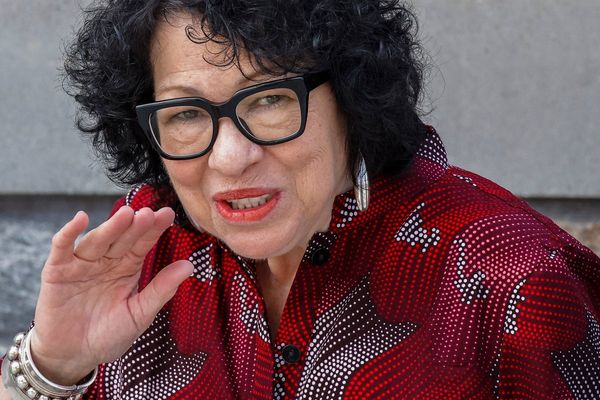
In early August 2011, my wife Anne and I were participants at the Byron Bay Writers Festival. News Corp was a sponsor, having supplied a festival tent, along with which came the editor of The Weekend Australian, Nick Cater. One of the events was a discussion about The Australian between Cater and me. I believed it would be dishonest (and dangerous) if in our conversation I did not make clear the conclusions of my Quarterly Essay on The Australian, which was to be published the following month.
Anne sat next to Cater’s wife, Rebecca Weisser, then The Australian’s opinion editor and now editor of Quadrant. Recently, Wendi Deng had lunged at someone who threatened husband Rupert [Murdoch] with a cream pie. Anne joked that one of them might soon need to similarly intervene. Weisser told Anne that she need not be concerned. Only the left was uncivil. Anne mentioned the case of Anders Behring Breivik, the right-wing extremist who had recently murdered dozens of young Swedish Social Democrats in cold blood. Silence.
One audience member that afternoon was the veteran journalist Mungo MacCallum. He reported in the Lismore Echo of August 11 what happened between Cater and me:
Cater’s patently absurd line was to insist that The Australian is not an organ of the right. It is central, mainstream, indeed really old-fashioned Liberal … Cater kept on assuring his incredulous audience that the paper really believed in man-made climate change and in taking action about it, and was even in favour of a mining tax; it had said so in its editorials. When Manne pointed out that its treatment of both news and comment overwhelmingly opposed both propositions, Cater muttered that it was only an argument about what sort of action and what sort of tax. His derisory attempts at self-justification were greeted with well-merited loathing and contempt.
In front of this audience, Cater renewed an offer for me to write in The Australian. I declined. To do so, I said, would be to provide the paper with “legitimacy”. I had no intention of being rolled out as an alibi every time the paper was accused of being right-wing.
In our relations, Cater had always been courteous. It was a mistake to humiliate him in front of a left-wing Byron Bay audience. Nick Cater now became an implacable enemy, without the pretence even of civility, let alone courtesy. On August 19, The Australian’s “Cut & Paste” column – which I described as “the daily compendium of Schadenfreude and spleen” – was devoted to mockery of my political journey from right to left: “I’ve been everywhere Manne, I’ve been everywhere: A salute to an intellectual wanderer.” There were very many such “Cut & Pastes” to come.
That evening a “Great Debate” had been organised. The debaters were driven in a small bus to the venue, Byron Bay High School. I was one of the debaters; The Australian’s cartoonist, Bill Leak, whose journey had been from left to right, was another. He almost hissed his hatred at me.
My Quarterly Essay titled Bad News was published in September 2011. Before Bad News was published, The Monthly created a personal blog for me on its website, called Left, Right, Left. My first blog post came out on September 12, 2011, a week or so after the publication of Bad News. I was puzzled: “So far … to my considerable surprise, the essay has been more or less entirely ignored by my enemies on the right.” If The Australian maintained its silence, one of the arguments of Bad News – that the paper could not tolerate criticism – would seem to be disproved.
I need not have worried. The Australian’s first critique came from Paul Kelly on September 14. What was most interesting to me was Kelly’s undisguised anger. I was accused of “emotionalism”; of “dogmatism”, both “faith-based” and “hectoring”; of “blatant intellectual censorship” and “schoolboy scribblings”. “It is good,” he argued, “that Manne’s technique of handling opponents is put on the public record”. This was all quite unlike Kelly’s normally unruffled, authoritative, Olympian prose.
The Weekend Australian of September 17 was what Guy Rundle at Crikey called “a collector’s piece for the ages”. Guy advised readers to buy any issues they could lay their hands on. Alongside the editorial, “The bad news on good faith”, Bill Leak expressed his admiration with a cartoon of me sitting on the toilet, reading a copy of The Australian, shitting. When the reader reached the “Inquirer” section, they found a series of articles on Bad News, under the general headline of “Setting the record straight”, beginning with Nicolas Rothwell, who, with characteristic elegance and superciliousness, defended The Australian without mentioning my essay, and ending with Chris Mitchell’s more than 3,000 words. According to Guy, to call it a “ramble” would be “unfair to bushwalkers”. In between Rothwell and Mitchell, there were lengthy articles on Bad News by Greg Sheridan, Michael Stutchbury, Graham Lloyd and Chris Kenny.
A day after the September 17 issue of The Weekend Australian, I wrote to Nick Cater requesting a right of reply. He refused. On September 20, I wrote to the chief executive of News Limited, John Hartigan, requesting a right of reply. If not granted, I told him, I would take my case to the Press Council. On September 22, Greg Baxter, News Limited’s corporate affairs manager, replied on behalf of Hartigan. I had “abdicated” all rights because my Quarterly Essay had not reached the ethical standards News Limited required. Nonetheless, my right to reply was granted, so long as it met the industry’s “best standards”!
A Guy Rundle Crikey comment of September 22 got it right: “Coming up tomorrow – The Oz continues to not respond to the Manne essay.” And not respond it did. In the month or so following the publication of Bad News, The Australian published eight extended opinion columns, nine Bad News-connected “Cut & Pastes”, three editorials and one cartoon. In addition, during this month, The Australian published 33 letters, 31 of which were hostile.
These letters were as vicious as anything I had ever seen. According to John Kidd, my “intellectual arrogance” was “breathtaking”. According to John McCarthy, it was not The Australian I disliked, it was “the Australian people”. According to L.J. O’Donoghue, “given the rampant narcissism evident in the work, the professor must have dictated it to a stenographer. He wouldn’t have had a free hand to write anything.” And according to Ralph Hoskin, The Australian had not only “demolished” my “credibility” but “implied doubts” as to my “sanity”. Peter Kelly, the ageing cold warrior who had helped convince Mitchell that Manning Clark was the spy of the century, recalled a remark of Frank Knopfelmacher’s: “Manne will betray us all.” I wondered idly whether it was okay for a paper to describe someone as an arrogant, un-Australian, naturally treacherous, possibly insane, narcissistic wanker.
During this month of battery, there was only one surprise: Matthew Ricketson’s review of Bad News in The Australian was favourable. Stephen Romei, the books editor, was not someone who could be pushed around. And there was only one genuine amusement. “Cut & Paste” of October 11 quoted from an outside blog: “Can you imagine Robert Manne with a chainsaw?” For several years it was with a chainsaw that I had done my best to gather the family’s weekly wood.
On November 21, the chief orchestrator of The Australian’s campaign, Nick Cater, finally wrote a column on Bad News. He called me a “post-modernist” who had rejected the “Socratic” method of argument, and suggested that I was remiss in not having studied all editions of The Australian over the past 47 years.
In early March 2012, I received a phone call from a reporter at The Australian, Ean Higgins. He told me that, as a result of a “tip-off” from an anonymous academic, a “freedom of information” application had been registered regarding the non-fulfilment of promised outcomes of two Australian Research Grants I had been granted in 2000 and 2002, which had been used, according to the anonymous academic, for nothing beyond my two earlier Quarterly Essays.
I got to work at once and on March 6 published “Payback: The bullying tactics of the Murdoch press” on The Monthly’s website and on ABC’s The Drum. I had no intention of allowing myself to be placed on the defensive by The Australian with one of their accusatory house styles – “Accused by a fellow academic of failing to fulfil the condition of two lucrative research grants, Professor Manne batted away suggestions …” I pointed out: “In cases like this, when one of its editors whistles, its well-trained team of attack dogs – Andrew Bolt, Piers Akerman, Miranda Devine, Tim Blair et hoc genus – emerge from their various kennels, teeth bared, snarling, moving in for the kill.” And I provided a detailed summary of the results of the two ARC grants that included five books or book-length studies by me and my research associates, and many chapters and newspaper articles.
A News Limited solicitor, Jane Summerhayes, demanded unsuccessfully that both The Monthly and The Drum remove my post. In an Australian article of March 9, it turned out that the “editor” who had ordered the FOI request that Higgins had mentioned to me was the still-seething man who edited the weekend paper, Nick Cater. Higgins remarked: “I came to the conclusion with Nick Cater that this did look like a pretty solid publication list of Manne’s.” Mitchell complained that my article was obviously defamatory. He knew nothing about his own weekend editor’s FOI request: “[Manne’s] got me, Goebbels-like, directing something deep, dark and sinister … he’s trying to deconstruct me.”
This is an extract from Robert Manne’s newly released book A Political Memoir: Intellectual Combat in the Cold War and the Culture Wars (Black Inc).
Have something to say about this article? Write to us at letters@crikey.com.au. Please include your full name to be considered for publication in Crikey’s Your Say. We reserve the right to edit for length and clarity.







